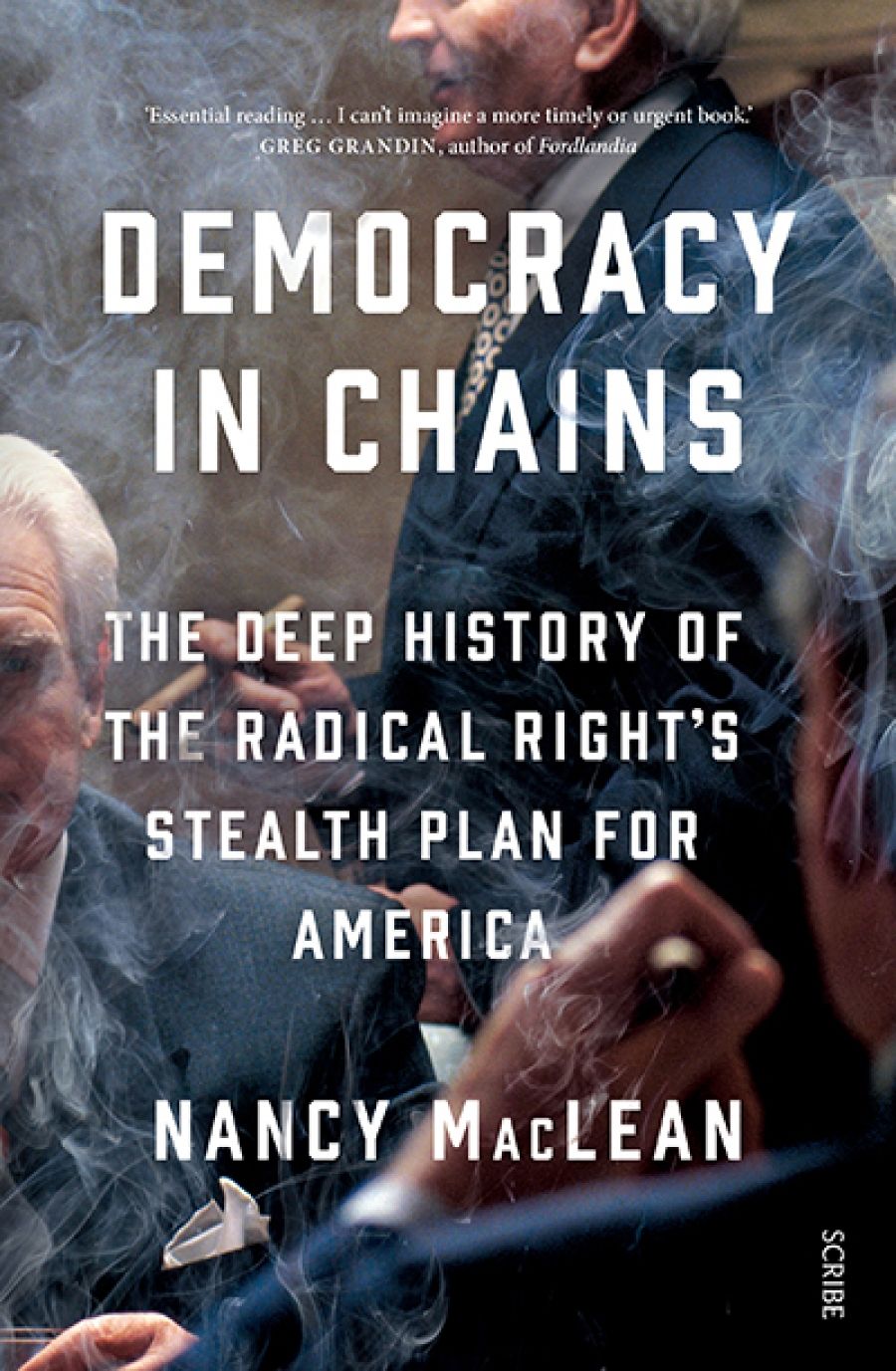
- Free Article: No
- Contents Category: Politics
- Custom Article Title: Max Holleran reviews 'Democracy in Chains: The deep history of the radical right’s stealth plan' for America by Nancy MacLean
- Review Article: Yes
- Online Only: No
- Custom Highlight Text:
On 12 August 2017 a mob of neo-Nazis descended on the campus of the University of Virginia in Charlottesville, chanting racial epithets while openly carrying rifles and pistols. Many of the participants were from groups that advocate not just racial supremacy but the end of the US federal government, which they see as tyrannical ...
- Book 1 Title: Democracy in Chains
- Book 1 Subtitle: The deep history of the radical right’s stealth plan for America
- Book 1 Biblio: Scribe, $35 pb, 366 pp, 9781925322583
Nancy MacLean’s gripping new book, Democracy in Chains: The deep history of the radical right’s stealth plan for America, tells the story of how Buchanan created the Virginia School of Political Economy during the 1960s. While most economics departments were becoming more mathematical and niche, Buchanan styled himself as a moral philosopher in the mould of Adam Smith. He worked to shape the UVA as a place that would be immune to campus activism, training his students to see the federal government as the creator of problems rather than an arbiter of weighty issues like civil rights. This was radical thinking at a time when most members of the Republican Party still had few qualms about using ‘big government’ for their military and economic priorities. MacLean shows how out of step Buchanan’s philosophy was even within the conservative Chicago school of economics in which he was trained: ‘what others described as taxation to advance social justice or the common good was nothing more than a modern version of mob attempts to take by force what the takers had no moral right to: the fruits of another person’s efforts. In his mind, to protect wealth was to protect the individual against a form of legally sanctioned gangsterism.’ For Buchanan, taxation was an act of violence and it selectively targeted the wealthy whose suffering was disregarded by the masses and permitted by the law.
Buchanan’s time at UVA was also inflected with racism: the state of Virginia battled the Brown vs. Board of Education decision for years, closing public schools to blacks between 1959 and 1964 in order to not comply with federally mandated integration. Mac-Lean stirringly draws the connection between ultra-free-market economics and Southern concepts of a racial order based on social Darwinism, both of which found like-minded adherents at the UVA in the 1960s. Buchanan and his colleague Warren Nutter, who would later work in the Defense Department for the Nixon administration, argued that the solution to integration was the privatisation of education with limited school vouchers. At the time this idea fell on deaf ears, even amongst conservatives, but it foreshadowed the current agenda of today’s pro-privatisation billionaire secretary of education, Betsy DeVos, whose thinking echoes Buchanan’s belief that the community values taught in primary school are often contrary to liberty.
The influence of James Buchanan and his euphemistically named brand of ‘public choice’ economics had disastrous effects that can be seen far more clearly than the usual academic pipeline of white papers and advisory councils. Rather, Buchanan was an eager guest of the Chilean General Augusto Pinochet after he overthrew the democratically elected socialist leader Salvador Allende and installed a military dictatorship that held power through torture and ‘disappearing’ opponents. He helped Pinochet shape a new constitution that dramatically favored the wealthy, not only in economic policy but also through mass voter disenfranchisement. At the same time, Buchanan’s policies in the United States called for cuts that would do away with social security (retirement) in the name of ‘reform’, while using the money saved to lighten the tax burdens of the wealthiest families.
 James M. Buchanan (Atlas Network, Wikimedia Commons)
James M. Buchanan (Atlas Network, Wikimedia Commons)
Buchanan, departed severely from the conservatives of the Nixon and Reagan eras. He didn’t just regard government programs as inefficient: ‘Buchanan believed government failed because of bad faith: because activists, voters, and officials alike used talk of the public interest to mask the pursuit of their own personal self-interest at others’ expense. His was a cynicism so toxic that, if widely believed, it would eat like acid at the foundations of civic life.’ The book shows how this distrust for elected officials has mushroomed since the 1980s, culminating in Donald Trump, who has divided the Republican Party and impugns the entire political system. However, as exemplified by Trump, the right’s promise to eradicate the federal government is frequently not borne out. Instead, the state is the prize for the highest bidder to be wielded by oligarchical interests. Once these interests gain traction through think tanks, state legislatures, or executive orders, they cut some regulatory functions of the government but they also use taxes to subsidise business ventures while programs like social security, healthcare, and food stamps are mercilessly slashed.
Looking back at Buchanan’s market orthodoxy from today’s vantage point of the worst inequality since the Great Depression, MacLean is left to wonder how American billionaires went so far to the right and, to a large extent, took the country with them. The book energetically asks us why economic freedom came to outstrip political freedom and why so many people in the United States identify with the rich: seeing taxation not as a necessary sacrifice but as an unjust shakedown by which the prosperous few are made to suffer the tyranny of the impoverished many.


Comments powered by CComment